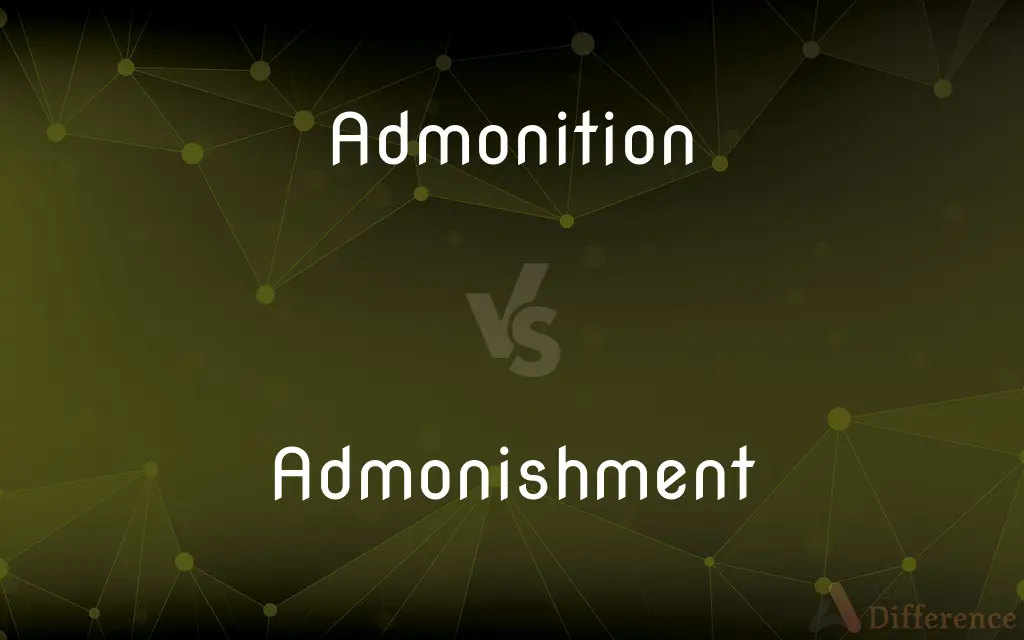Admonition vs. Admonishment — What's the Difference?
By Fiza Rafique & Maham Liaqat — Updated on April 1, 2024
Admonition is a mild, often indirect warning or advice, while admonishment is a firmer reproof, usually direct and more serious in tone.

Difference Between Admonition and Admonishment
Table of Contents
ADVERTISEMENT
Key Differences
Admonition involves giving a gentle or friendly warning to correct behavior without harshness, focusing on guidance. On the other hand, admonishment carries a stronger tone of reproof or scolding, often used to address more serious issues or repeated mistakes.
Admonition often aims at preventive measures, subtly guiding individuals away from potential missteps. Whereas admonishment is reactive, addressing an error or misconduct that has already occurred, emphasizing the need for correction.
Admonitions are usually conveyed in a softer, more constructive manner, aiming to encourage reflection and self-correction. In contrast, admonishments may involve direct criticism and are more likely to be explicit about the wrongdoing, aiming to deter future incidents.
While admonition can be seen as a form of gentle encouragement towards the right behavior, admonishment serves as a clear signal of disapproval, making it more impactful in certain situations.
Admonition and admonishment both play roles in discipline and guidance but differ in their approach and intensity. Where admonition may suffice for minor errors or to guide someone inexperienced, admonishment might be necessary for more serious infractions or to address repeat offenses.
ADVERTISEMENT
Comparison Chart
Tone
Gentle, indirect
Firm, direct
Purpose
To advise and guide before a mistake is made
To reprove or scold for a mistake already made
Nature
Preventive, encouraging
Reactive, discouraging
Communication
Soft, often conveyed in a constructive manner
Direct, often highlighting the wrongdoing
Ideal Situations
Minor errors, guidance for inexperienced individuals
Serious infractions, addressing repeat offenses
Compare with Definitions
Admonition
A subtle reminder to prevent future mistakes.
The note on the fridge served as an admonition to replace the milk after using it.
Admonishment
A stern reprimand for wrongdoing.
The judge's admonishment to the jury emphasized the seriousness of their duty.
Admonition
A mild cautionary suggestion.
The sign by the lake was an admonition to swimmers about the potential for strong currents.
Admonishment
An expression of disapproval to deter future incidents.
The captain’s admonishment after the loss galvanized the team.
Admonition
A gentle warning against a possible mistake.
The teacher's admonition about plagiarism guided students towards originality.
Admonishment
Direct criticism for a specific mistake.
His public admonishment for lateness ensured he was never late again.
Admonition
Indirect advice for improvement.
Her mentor’s admonition encouraged her to speak up more in meetings.
Admonishment
A firm correction of behavior.
Her mother's admonishment about her grades led to a drastic improvement.
Admonition
Soft guidance to correct behavior.
His father's admonition to be more careful with money was taken to heart.
Admonishment
A clear warning against repeat offenses.
The employee's admonishment was a final warning before potential dismissal.
Admonition
Admonition (or "being admonished") is the lightest punishment under Scots law. It occurs when an offender who has been found guilty or who has pleaded guilty, is not given a fine, but instead receives a lesser penalty in the form of a verbal warning (admonished), due to a minor infringement of the law; the conviction is still recorded.
Admonishment
To counsel (another) against something to be avoided or warn (that something is dangerous)
"[Another competitor in the race] admonished him on the dangers of going out too fast" (Neal Bascomb). "Magazine articles ... admonished that women's financial independence was driving a wedge between husband and wife" (Lillian Faderman).
Admonition
Cautionary advice or warning
Remember the doctor's admonition to keep the bandage dry.
Admonishment
To urge or exhort (someone to do something)
"Writers like Emerson and Thoreau ... admonished us to develop ourselves according to nature" (E.D. Hirsch).
Admonition
Mild, kind, yet earnest reproof.
Admonishment
To remind (someone) of something forgotten or disregarded, as an obligation or a responsibility.
Admonition
Gentle or friendly reproof; counseling against fault or oversight; warning.
Admonishment
To reprove gently but earnestly
"Lincoln pursued his interests in defiance of established norms. Far from being praised, he was consistently admonished" (Joshua Wolf Shenk).
Admonition
Gentle or friendly reproof; counseling against a fault or error; expression of authoritative advice; friendly caution or warning.
Admonishment
The act of admonishing; a reprimand or rebuke.
Admonition
Cautionary advice about something imminent (especially imminent danger)
Admonishment
Admonition.
Admonition
A firm rebuke
Admonishment
A firm rebuke
Common Curiosities
Can admonition be considered positive?
Yes, admonition is generally seen as a positive, constructive way to guide or prevent mistakes due to its gentle nature.
Is admonishment always negative?
While admonishment can seem negative due to its direct and firm tone, it serves the important function of correcting behavior and preventing future issues.
Why might someone choose admonishment?
Admonishment might be chosen to address serious or repeated mistakes, where a stronger response is necessary to ensure correction.
Can admonition and admonishment be part of effective teaching?
Yes, both can be effectively used in teaching to guide, correct, and encourage appropriate behavior and decision-making.
Are there specific situations where admonition is preferred?
Admonition is preferred in situations where a gentle nudge can prevent missteps or when dealing with sensitive issues.
Can the tone of admonition affect its reception?
Yes, a softer, more encouraging tone can make admonition more receptive, encouraging self-reflection and correction.
What is an admonition?
An admonition is a gentle or indirect warning or piece of advice, often given to prevent a mistake or misbehavior.
How does admonishment differ from admonition?
Admonishment is firmer and more direct than admonition, often involving a reproof or scolding for a specific mistake or misbehavior.
When should one use admonition over admonishment?
Admonition should be used when a gentle warning or advice is sufficient to guide behavior, especially before a mistake is made.
When is admonishment necessary?
Admonishment is necessary when a more serious or direct form of correction is needed, often after a mistake has been made.
Is the timing of admonishment important?
Yes, timely admonishment following a mistake can be crucial in ensuring the lesson is learned and the behavior is corrected.
How do cultural differences impact the perception of admonition and admonishment?
Cultural differences can significantly affect how admonition and admonishment are perceived, with some cultures valuing indirect guidance over direct criticism.
What are key elements of an effective admonishment?
Clarity, directness, and a focus on the specific behavior or mistake being addressed are key to effective admonishment.
Can admonition lead to self-improvement?
Yes, by encouraging reflection and self-correction, admonition can be a catalyst for personal growth and improvement.
How does one effectively deliver an admonition?
Effective admonition involves being indirect and gentle, focusing on the potential for improvement and the importance of making better choices.
Share Your Discovery

Previous Comparison
Problematic vs. Problematical
Next Comparison
Biology vs. EcologyAuthor Spotlight
Written by
Fiza RafiqueFiza Rafique is a skilled content writer at AskDifference.com, where she meticulously refines and enhances written pieces. Drawing from her vast editorial expertise, Fiza ensures clarity, accuracy, and precision in every article. Passionate about language, she continually seeks to elevate the quality of content for readers worldwide.
Co-written by
Maham Liaqat














































